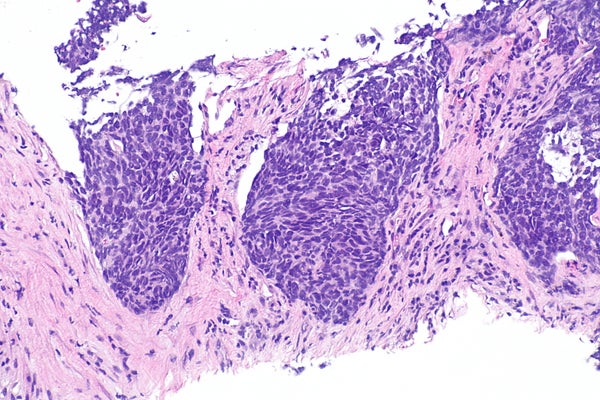A daily pill may halve the risk of death for lung cancer patients with a particular type of genetic mutation who have undergone surgery, according to much awaited clinical trial results.
The drug is called osimertinib, which AstraZeneca Pharmaceuticals produces under the brand name Tagrisso. It has been used to treat later-stage lung cancer since the U.S. Food and Drug Administration granted it an accelerated approval in 2015. The trial findings were published on June 4 in the New England Journal of Medicine and presented on the same day at the annual meeting of the American Society of Clinical Oncology in Chicago.
The new study offers evidence that the same drug can improve outcomes for people with earlier stages of lung cancer, says Roy Herbst, deputy director of the Yale Cancer Center and co-lead author of the paper. “It’s really taking personalized therapy from advanced metastatic disease and moving it all the way to the earliest stages of lung cancer treatment,” Herbst says.
On supporting science journalism
If you're enjoying this article, consider supporting our award-winning journalism by subscribing. By purchasing a subscription you are helping to ensure the future of impactful stories about the discoveries and ideas shaping our world today.
Lung cancer is one of the most common cancers in the U.S. The American Cancer Society expects more than 230,000 new cases to be reported this year. It’s also the deadliest, responsible for nearly a quarter of U.S. cancer deaths in 2020, according to the Centers for Disease Control and Prevention. Osimertinib is what scientists call a tyrosine kinase inhibitor, a substance that affects a class of enzymes involved in cell signaling, growth and division. The new findings will only be relevant for a small fraction of people who have a specific type of genetic mutation. But for them, Herbst says, early treatment with the drug could make a big difference. “We expected this would work but not this well,” he says.
The trial included 682 patients with the mutation, called T790M. Just under half of them took osimertinib once a day; the others took a placebo pill. All the participants had had a tumor surgically removed, and their cancers were considered stage 1, 2 or 3. (This scale goes up to stage 4, which is the most severe.) Some participants had also completed chemotherapy treatments. Each patient took the medicine for three years unless they had to discontinue it, and they were monitored for a median of five years (although some were followed for up to 6.8 years total).
After five years, 88 percent of patients on osimertinib remained alive, compared with 78 percent of the control population—meaning that the drug about halved the risk of death during the five-year period. Osimertinib also appeared to reduce disease recurrence. There were about twice as many recurrences among the people taking placebos.
Of the patients in the trial with more advanced, stage 3 cancers, 85 percent of those on osimertinib survived after five years, compared with 67 percent of those who took the placebo—an even greater reduction in deaths.
Those are compelling statistics, says Nagashree Seetharamu, a thoracic and head and neck oncologist at Northwell Health, who wasn’t involved in the new study. Herbst’s presentation at the conference clarified many of the questions other researchers had, she says, noting that a previous report from the group had left some observers unconvinced that the drug materially changed patients’ outcomes rather than just buying a little more time. She says it makes sense to treat eligible patients with this approach, although she’d still like to see longer-term results reported.
Seetharamu also says the new study leaves open important questions about how osimertinib and chemotherapy work together because some people in both the control and test groups had received chemo before entering the study.
Because osimertinib only works for people with a specific genetic mutation, both Seetharamu and Herbst emphasize that the results underscore the ways genetic techniques can improve outcomes by matching people with the most promising treatment options. “Genomic testing is extremely important,” Seetharamu says. “We’ve known that it’s very important in patients with later-stage disease, but now, with studies like this one, we know that it’s also important in earlier-stage disease.”
Herbst says he hopes the combination of genetic testing and using top-shelf drugs catches on for other types of cancer as well. These drugs can come at a cost, however. Multiple studies have questioned whether the improvements osimertinib can make are worth the staggering price tag of about $17,000 per month in the U.S.
Still, Herbst is pleased with the study’s findings. “When I started working in lung cancer, there was nothing that could be offered. There was no targeted therapy; there was no immunotherapy,” he says. “We’ve taken new drugs based on the science to the clinic; we’ve learned how to use them; we’ve learned how to personalize them.”
